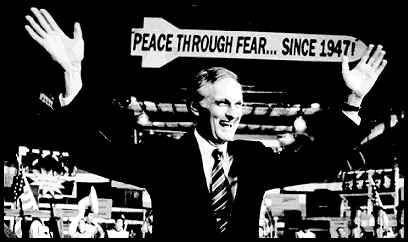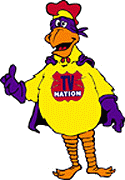Michael Moore
At Play in the House of the Ogre
by Matt Robesch
The Free Press
In Canadian Bacon, a fictional comedy by Michael Moore (Roger & Me, TV Nation), the President of the United States' approval ratings are dropping because he has purposely avoided armed conflicts. His advisors inform him lack of conflict is precisely his problem. You see, the cold war has been over for years and all the U.S.'s bogus boogey men are either dead, "making license plates" in Florida, or reformed. Many in the oval office and corporate America find this notion upsetting.
To boost his ratings the prez agrees to pre-fabricating a cold war. When the Russians are unwilling to comply, the president and his handlers are forced to find a new enemy... but who? Then a brawl breaks out in the stands of a U.S./Canada hockey match on Canadian soil, and several Americans (including John Candy in his final role) are arrested. The president is advised that this is the international incident he needs to win over the American public.

The buck stops with Alan Alda in 'Canadian Bacon'.
From here on the film details the ways in which the American public (via 'Operation Canadian Bacon') is turned against the nation of Canada. Step by step the president and the public are made to believe Canada has been engaging the U.S. in subterfuge for decades. Conspiracy theories run rampant ("the Canadians have amassed 90 percent of their population within 100 miles of the US border!!") and soon maple syrup and ice skates become symbols of tyranny. The spoof is unrelenting and similarities abound between this fictional account of political media twisting and that which occured during the Persian Gulf War.
It may not surprise anyone that Michael Moore had power struggles of his own during the creation of this political farce. The initial financing of the film was provided by Propaganda Films (owned by media giant Polygram), who wanted to promote the picture as a typical John Candy comedy vehicle. Moore states in a recent issue of Pulse!, "they wanted more of Uncle Buck. On the set, they'd be, 'Do you guys think you could write some more lines for John? Have him do more goofy stuff?' I'm going, 'Guys, it's not that film.'"
Candy, the film's staunchest supporter and biggest name star, held the film company at bay until post-production, adhering to the Moore script he signed to play. Shortly after Candy died, Propaganda took the film away from MGM, the original distributor. The uncompromised Moore version of Bacon is being distributed by Gramercy Pictures, another subsidiary of Polygram. Moore has since shown the film at national and international festivals to great critical and popular acclaim. The film, completed almost two years ago, made a brief theatrical showing on screens in New York, L.A., Washington D.C., Buffalo and Toronto and then was sent directly to video. Keep in mind that during the same two year period this film was being completed, Michael Moore's popular, emmy award-winning television series, TV Nation was picked up and canceled by two of the four major networks (NBC in 1994 and FOX in 1995).
 Michael Moore offers America some of the most daring, unrelenting political art the nation has seen. Apparently this makes the television and movie powers-that-be very nervous about supporting his projects. Who can blame them? When TV Nation encouraged viewers to meet Crackers the Corporate Crime Fighting Chicken on the corner of such-and-such street at such-and-such date/time, the people who arrived weren't gathered to listen to a ho-hum political speech or to get autographs from a TV star. They showed up to tell Crackers (and Moore) which companies and/or banks in their city were fucking with them. Then the crowd would march to one of those places and confront the institution... with TV cameras rolling! Granted, Moore rarely got past the security guards in the elevator lobby, but the message was never lost: Here is a group of pissed off Americans, with a well organized and articulate spokesperson, directly confronting those who are exploiting them. When was the last time you saw something like this on TV? Probably sometime in the early '60s (if you were alive), only then it was on the news instead of an info-tainment show and the crowds were dispersed with high powered water hoses and rabid dogs.
Michael Moore offers America some of the most daring, unrelenting political art the nation has seen. Apparently this makes the television and movie powers-that-be very nervous about supporting his projects. Who can blame them? When TV Nation encouraged viewers to meet Crackers the Corporate Crime Fighting Chicken on the corner of such-and-such street at such-and-such date/time, the people who arrived weren't gathered to listen to a ho-hum political speech or to get autographs from a TV star. They showed up to tell Crackers (and Moore) which companies and/or banks in their city were fucking with them. Then the crowd would march to one of those places and confront the institution... with TV cameras rolling! Granted, Moore rarely got past the security guards in the elevator lobby, but the message was never lost: Here is a group of pissed off Americans, with a well organized and articulate spokesperson, directly confronting those who are exploiting them. When was the last time you saw something like this on TV? Probably sometime in the early '60s (if you were alive), only then it was on the news instead of an info-tainment show and the crowds were dispersed with high powered water hoses and rabid dogs.
As corny as this may sound to some, Michael Moore could be the closest the MTV generation gets to having a Martin Luther King type of liberator to call its own. I suppose, to a degree, the television networks and movie companies are aware of this so are loathe to give Moore a soapbox of such vast proportions. Why else would executives from two of the greediest industries in the United States unanimously turn down, hinder, or give up on projects guaranteed to make their investors a lot of money?
[Home]
[This Issue's Directory]
[WFP Index]
[WFP Back Issues]
[E-Mail WFP]
Contents on this page were published in the July/August, 1996 edition of the Washington Free
Press.
WFP, 1463 E. Republican #178, Seattle, WA -USA, 98112. -- WAfreepress@gmail.com
Copyright © 1996 WFP Collective, Inc.

 Michael Moore offers America some of the most daring, unrelenting political art the nation has seen. Apparently this makes the television and movie powers-that-be very nervous about supporting his projects. Who can blame them? When TV Nation encouraged viewers to meet Crackers the Corporate Crime Fighting Chicken on the corner of such-and-such street at such-and-such date/time, the people who arrived weren't gathered to listen to a ho-hum political speech or to get autographs from a TV star. They showed up to tell Crackers (and Moore) which companies and/or banks in their city were fucking with them. Then the crowd would march to one of those places and confront the institution... with TV cameras rolling! Granted, Moore rarely got past the security guards in the elevator lobby, but the message was never lost: Here is a group of pissed off Americans, with a well organized and articulate spokesperson, directly confronting those who are exploiting them. When was the last time you saw something like this on TV? Probably sometime in the early '60s (if you were alive), only then it was on the news instead of an info-tainment show and the crowds were dispersed with high powered water hoses and rabid dogs.
Michael Moore offers America some of the most daring, unrelenting political art the nation has seen. Apparently this makes the television and movie powers-that-be very nervous about supporting his projects. Who can blame them? When TV Nation encouraged viewers to meet Crackers the Corporate Crime Fighting Chicken on the corner of such-and-such street at such-and-such date/time, the people who arrived weren't gathered to listen to a ho-hum political speech or to get autographs from a TV star. They showed up to tell Crackers (and Moore) which companies and/or banks in their city were fucking with them. Then the crowd would march to one of those places and confront the institution... with TV cameras rolling! Granted, Moore rarely got past the security guards in the elevator lobby, but the message was never lost: Here is a group of pissed off Americans, with a well organized and articulate spokesperson, directly confronting those who are exploiting them. When was the last time you saw something like this on TV? Probably sometime in the early '60s (if you were alive), only then it was on the news instead of an info-tainment show and the crowds were dispersed with high powered water hoses and rabid dogs.



